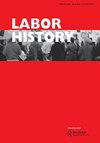(半)边缘国家的技术出口:南斯拉夫-伊朗工业合作和劳动力流动的案例(1980-1991)
IF 0.7
4区 管理学
Q1 HISTORY
引用次数: 0
摘要
本文探讨了1980年至1991年期间南斯拉夫临时劳动力迁移的经验,这涉及到前南斯拉夫国有铜加工“巨头”博尔矿业和冶炼联合公司与伊朗最大的铜公司伊朗国家铜工业公司之间的工业合作,这是1980年至1991年间南斯拉夫出口专有技术(高技能知识和专业知识)的结果。基于对参与南斯拉夫项目的个人的采访,辅以对该时期文件和历史报纸的分析,本文分析了管理官僚即兴创作和工作即兴创作的日常实践。这篇文章展示了这种即兴创作如何帮助克服了南斯拉夫过度和僵化的社会主义官僚主义,并使南斯拉夫的企业家资本主义企业成为可能。此外,它还认为,技术诀窍的出口构成了对资本主义关系再生产的沉默接受,这有助于巩固1980年代后期社会主义市场的自由化进程。我们认为,这种临时的劳动力迁移和南斯拉夫工人经常进行的临时工作不能被视为对西方/北方霸权的抵抗或替代。相反,我们认为,这些做法是资本主义在半边缘地区冒险的推动者。本文章由计算机程序翻译,如有差异,请以英文原文为准。
The export of know-how at the (semi-)peripheries: the case of Yugoslav–Iranian industrial collaboration and labor mobility (1980–1991)
ABSTRACT The paper explores experiences of temporary labor migration that entailed Yugoslav export of know-how (highly skilled knowledge and expertise) between 1980 and 1991, a result of industrial collaboration between Mining and Smelting Combine Bor, a state-owned copper-processing ‘giant’ in former Yugoslavia, and the biggest copper company in Iran, National Iranian Copper Industries Company. Based on interviews with individuals engaged in the Yugoslav project, supplemented by analysis of documents and historic newspapers from that period, the paper analyzes everyday practices of managerial bureaucratic improvisations and improvisations at work. The article shows how such improvisations helped overcome excessive and rigid Yugoslav socialist bureaucracy and made Yugoslav entrepreneurial capitalist ventures possible. Moreover, it argues that the export of know-how was constitutive of silent acceptances of reproduction of capitalist relations, which helped consolidate the process of liberalization of the socialist market in the late 1980s. We argue that such temporary labor migration and the often improvised work carried out by the Yugoslav workers cannot be seen as a resistance or alternative to the Western/Northern hegemonies. Rather, we argue that such practices were facilitators of the capitalist ventures at semi-peripheries.
求助全文
通过发布文献求助,成功后即可免费获取论文全文。
去求助
来源期刊

Labor History
Multiple-
CiteScore
1.00
自引率
28.60%
发文量
44
期刊介绍:
Labor History is the pre-eminent journal for historical scholarship on labor. It is thoroughly ecumenical in its approach and showcases the work of labor historians, industrial relations scholars, labor economists, political scientists, sociologists, social movement theorists, business scholars and all others who write about labor issues. Labor History is also committed to geographical and chronological breadth. It publishes work on labor in the US and all other areas of the world. It is concerned with questions of labor in every time period, from the eighteenth century to contemporary events. Labor History provides a forum for all labor scholars, thus helping to bind together a large but fragmented area of study. By embracing all disciplines, time frames and locales, Labor History is the flagship journal of the entire field. All research articles published in the journal have undergone rigorous peer review, based on initial editor screening and refereeing by at least two anonymous referees.
 求助内容:
求助内容: 应助结果提醒方式:
应助结果提醒方式:


